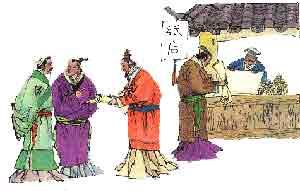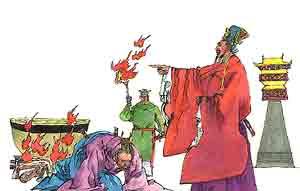| Chinese Idioms Learning (16) | |
|---|---|
| Dec 30, 2007 00:24 | |
 | Source: jsedu.net. No.1 洛阳纸贵 luò yáng zhǐ guì. History: Overwhelming Popularity of a New Work Causes Shortage of Printing Paper In the Jin Dynasty (265-420) there was a famous writer whose name was Zuo Si who, however, was very naughty and did not like to study when he was a small kid.His father often got angry, and yet young Zuo Si was as naughty as ever and would not study hard. One day, Zuo Si's father was chatting with his friends. his friends envied him his clever and loverly son. Hearing this, Zuo si's father sighed, "Please do not mention him. My son Zuo si does not study as well as I did when I was young, although I did not study well enough myself. It appears that he is actually a good-for-nothing." So saying, he looked disappointed. All this was witnessed by young Zuo Si. He felt very sad, feeling intensely that he would not be able to have a bright future if he did not study hard. So he was determined to study assiduously from then on. Day after day and year after year, Zuo Si gradually grew up. Because of his unremitting afforts in hard study, he became an erudite scholar and wrote very excellent essays. The "Ode to the Capital of the State of Qi", which took him one year to write, showed his brilliant literary talent and laid the foundation for his becoming an outstanding writer. then he planned to write an "Ode to the Capitals of the Three Kingdoms of Wei, Shu Han and Wu" with the local conditions and customs as well as the produce of the three capitals as its content. In order to achieve the desired effect in content, structure and language, he applied himself to research work with great concentration, and was so absorbed in creative writing as to forget food and sleep. It took him ten whole years to finish the writing of "Ode to the Capitals of the Three Kingdoms of Wei, Shu Han and Wu", a literary masterpiece. The "Ode to the Capitals of the Three Kingdoms of Wei, Shu Han and Wu" was well received by the broad masses of readers after it made its appearance to the public, and people considered it as superbly written as the "Ode to the Western Capital (Changan) and to the Eastern Capital (Luoyang)" written by Ban Gu (32-92) and the "Ode to the Western Capital and to the Eastern Capital" written by Zhang Heng of the Han Dynasty (206 B.C. to A.D.220). As the art of printing had not been invented at that time, people who were fond of this "Ode" had to make handwritten copies of it themselves. As there were so many people who vied with each other in making handwritten copies, the supply of writing paper fell short of the demand in Luoyang went up greatly. This story comes from "The life of Zuo Si" in the book "Literary Field" of The History of the Jin Dynasty. Based on this story, people have coined the set phrase "the price of writing paper went up greatly", meaning the overwhelming popularity of a new work causes shortage of printing paper, to show how popular an outstanding piece of literary work is.  |
| Dec 30, 2007 00:26 | |
 | No.2 请君入瓮 Qing 3 Jun 1 Ru 4 Wen 4. It means Kindly Step into the Vat--Try What You Have Devised against Others. History: In order to suppress those who were against her, Wu Zetian, the empress of the Tang Dynasty (618-907), appointed a few merciless persons to be judges. Two of them were extremely brutal; one was called Zhou Xing and the other was called Lai Junchen. They killed many upright civil and military officials as well as ordinary people by framing up cases against tham and by administering inhuman corporal punishment to them. Once, Wu Zetian received a letter which informed against Zhou Xing. The letter aside that Zhou Xing was plotting a rebellion in collaboration with others. Wu Zetian was furiously angry when she read the letter, and immediately ordered Lai Junchen to deal with the case severely. Hearing the order, Lai Junchen had misgivings about it. He knew that Zhou Xing could not be forced to tell the truth merely by using a letter informing against him because he was very sly and crafty. Lai Junchen also knew that he would not be for given if he should fail in dealing with the case, because the empress would certainly blame him and punish him. How could he solve the problem then? He turned the problem over and over in his mind, and finally thought out a "brilliant scheme". Lai Junchen had a sumptuous feast prepared, and invited Zhou Xing to his home. The two of them urged each other to drink, and they talked while drinking. After the wine had gone round three times, Lai Junchen pretended to sigh, "When Ihandle cases in ordinary times, I often com across prisoners who stubbournly refuse to admit they are guilty. I wonder if you have any effetive measures." Hearing this, he took a sip of the wine. Lai Junchen immediately pretended to be very earnest, saying, "Oh, please do tell me at once." Smiling insidiously, Zhou Xing said, "Get a big vat, scorch it hot with charcoal fire all around, and then let the prisoner come into the vat. Will the prisoner fail to make a confession of his crime?" Hearing this. LaiJunchen nodded his head in approval repeatedly. He then ordered his subordinates to bring a big vat, and had a charcoal fire lit all around it as Zhou Xing had said. He then turned to Zhou Xing and said, "Someone in the imperial court has informed against you, saying that you are plotting a rebellion. The empress has ordered me to deal with the case severely. So I beg your pardon, but would you kindly step into the "Someone in the imperial court has informed against you, saying that you are plotting a rebellion. The empress has ordered me to deal with the case severely. So I beg your pardon, but would you kindly step into the vat?" Hearing this, Zhou Xing dropped his wine cup to the ground and the cup broke with a crash. Then he knelt down with a flop, nodded repeatedly and said, "I am guilty. I confess I am guilty."  |
| Dec 30, 2007 12:56 | |
 | I enjoyed this one the most 请君入瓮, ZOEY. I've "outsmarted" myself more than once, but never had to step into a vat thank heavens. In use today, does 洛阳纸贵 mean to become a best seller? That is how Wenlin translates it. ...but "making the cost of writing paper increase" is a nice turn of phrase. :-) |
Post a Reply to: Chinese Idioms Learning (16)






 Copyright © 1998-2026 All rights reserved.
Copyright © 1998-2026 All rights reserved.